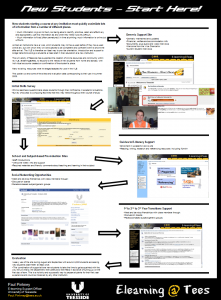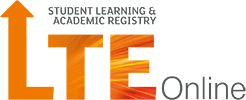Last week I had the pleasure of attending the European First Year Experience Conference in Groningen. Diane Nutt of CLQE is Chair of the Conference Organising Committee reflecting the University’s commitment to the first year experience, which is such an important issue, and it’s great to see the conference blossoming. As well as Di and me, Matt Portas of SSSL and Jules Pringle, Education and Welfare Officer for the Students Union, made the trip.
After a three-hour train journey from Schiphol it was a relief to arrive in the beautiful town of Groningen. Out of a population of 185,000 students account for around 50,000 and the town has a real student atmosphere and apparently a real commitment to green travel. Negotiating any street without being run over by one of the town’s ubiquitous bikes is not an easy task! Thankfully the Teesside delegation did not have much trouble en route to the conference as our hotel was ideally located across the street from the University Medical Centre Groningen where the conference programme was delivered. The UMCG is a fantastic example of how medical treatment and training can be combined in one place, providing all the specialist clinical facilities of and in-house research and teaching. Everything is housed within a ‘city within a city’ with covered streets, gardens, banks and lunchrooms that feels very little like a traditional hospital and far nicer for it.
Professor Henk Schmidt of the Erasmus University Rotterdam gave a very thought-provoking and challenging address entitled: ‘Preventing student dropout: Is there anything that works?’ His conclusion based on research gathered from a radically different approach to curriculum design across a number of programmes in the Netherlands where students must successfully pass all assignments/exams at the first attempt with very limited (or no) opportunity for re-submission/re-sits. The philosophy is based on the idea that everyone (students included) is a ‘just-in-time manager’ and that if there is something more interesting to do than study, we will go off and do it! Only when we really have to work will we do so. There was also emphasis on the importance of properly used self-directed study time, and evidence to show that increasing lecture time in place of this had a negative effect on student learning and results. The other major point was that curricula should be designed in parallel, i.e. medical students study how the respiratory system works, not separate strands of biology, physiology and chemistry.
The evidence was compelling with the University of Groningen having redesigned its curriculum for a number of medical courses in 1993. An already high graduation rate of 76% had increased to 86% while results across other universities in the country delivering the same training via a different curriculum remained static. There were a number of other examples of the success of this approach that I didn’t manage to write down (we learn nothing at lectures, rather we remember general themes!) and it was a lecture that I think will leave a lasting impression on the audience.
Will Carey and Matt Valentine of the University of Manchester gave a very useful account of the introduction (and subsequent success) of a peer-mentoring programme at the University of Manchester across a range of different disciplines. Will is a Teaching and Learning Adviser and Matt is a Peer Mentoring Intern, and the project showed a great emphasis on giving students ownership of the scheme, listening to their responses to it via studies and questionnaires and then constructively implementing the changes identified.
Another highlight was the ‘show and tell’ format of the conference poster sessions. Rather than the usual stand-by-your-poster format six similar topics were each grouped together and during a 1.5hr session each presenter gave a (very!) short presentation on their poster limited to 5 minutes and two slides. After each presenter had done so, attendees milled around asking questions of whichever presenters they wished, followed by a chaired discussion for the whole room.
 I presented on the ‘New Students – Start Here!’ pre-induction module development process that I undertook, in conjunction with colleagues from retention and in the University schools, last summer, and the format was a very rewarding one. The main differences being the level of feedback received on what you have been doing, and the new ideas generated by the group discussion.
I presented on the ‘New Students – Start Here!’ pre-induction module development process that I undertook, in conjunction with colleagues from retention and in the University schools, last summer, and the format was a very rewarding one. The main differences being the level of feedback received on what you have been doing, and the new ideas generated by the group discussion.
At the end of a long day on Thursday I attended the appropriately named ‘Waking the Dead’ presentation from Bill Byers of the University of Ulster on effective use of Participant Response Systems, or as they seem to be universally known ‘clickers’. During recent E@T lunches a range of these have been demoed by various companies, but I had yet to see a demo that applied the use of specific questioning techniques to their use to achieve high quality results. Bill and his colleague did this very effectively, discussing the value of null responses, length and number of questions and designing questions for discussion. Overall it showed that ‘clickers’ can be an extremely valuable tool in H.E., and one that students really like to use.
On Friday morning I made it to an interesting pair of presentations. The first from Marjolein Heijne-Penninga was based on research done at the UMCG in Groningen and highlighted that deep learning approaches are not necessarily the be-all and end-all of H.E. today. After questioning students the study showed that those with a high need for cognition performed better in open and closed book tests, than students who favoured a deep learning approach. Some possible reasons including the changing environment learners are born into were suggested, and the need for further research into the role of cognition-based activities within the curriculum to meet the changes.
The second by Liesje Coertjens of the University of Antwerp (kudos to Liesje for presenting so well after a late night explaining Learning Patterns vs Learning Styles in the bar!), detailed the development of a short inventory of learning patterns (SILP), based on Vermunt’s inventory of learning styles (ILS). This short self-assessment questionnaire allows students to identify themselves as favouring a particular learning pattern, and the study went on to show how these patterns could then be linked to study results, making it a particularly useful tool for monitoring students learning during the first year in H.E.
All in all the conference was excellent with a real spirit of sharing evident, and I left with a genuine belief in the commitment of the attendees to making a real difference to the first year experience. There were certainly things for us to take back and think about that we will implement to try to benefit Teesside students. Next year’s conference will be hosted by the University of Antwerp, and I’m hoping I’ll have the chance to attend, and that Teesside may send an even larger contingent next year, to what will be a hugely valuable conference.
